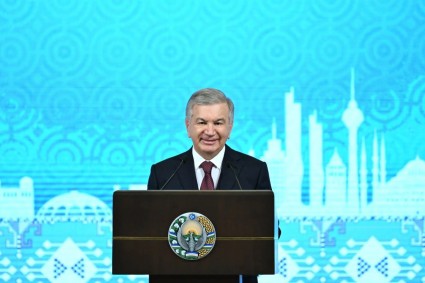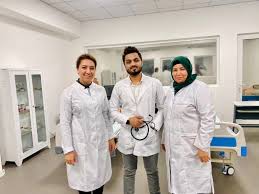Henk Stigter has been working as an Agricultural Councellor at the Netherlands embassy in Moscow since September 2020. His working area includes Russia, Belarus, Kazakhstan, Uzbekistan, Armenia and Kyrgyzstan.
The core of the work focuses on market access, trade and investment promotion for agricultural products, agro-technology, knowledge and training.
Mr. Henk Stigter, tell us briefly about the secret of success of the agriculture in the Netherlands, considering the geographical peculiarities of the country.
Indeed, the Netherlands, is a rather small country, that occupies an important position worldwide in the trade and logistics of agricultural goods. In 2020, the Netherlands exported 95.6 billion euros worth of agricultural goods. The Dutch are the second largest exporters of farmed goods in the world, after the U.S. It may seem like an anomaly, but in fact, the Netherlands is a small country with huge investments in agrifood innovation, creating some of the most cutting-edge methods to feeding its population and the world.
A lot of the Netherland’s success starts in the laboratories as Wageningen University is one of the leading research facilities looking to revolutionize food production. Innovation as a whole has impacted the Netherlands massively over the years and it has really helped to drive more modernized farming methods. In short, over time the Netherlands really will be farming for the future.
According to a review in National Geographic, introduced innovations have led to some of the most effective farming methods in the world. For instance, while the global average yield of potatoes per acre is approximately 9 tons, many farms in the Netherlands produce more than 20 tons. Water usage for many crops using Dutch methods is 90% lower. Usage of chemical pesticides in our large greenhouses has been almost eliminated.
The Netherlands aims to become the global leader in sustainable agriculture by 2030. This ambition entails a shift from growth in production volumes and cost price reductions towards optimization in resource use and food production, in harmony with nature. The government has published a plan of action to turn this vision into reality.
The policy’s efforts to support sustainable agriculture are the promotion of precision agriculture and farm innovations, creation of more possibilities for experimentation, rewards for sustainable farming practices and many more.
So, we can summarize that the secret of success of the agriculture of the Netherlands lies in so called “golden triangle” which means a tight cooperation of the government, private sector and research institutes.
As you may know, Uzbekistan has favorable climatic conditions for greenhouse farming, and now there is an increasing in interest in our country by many competing producers of such technology. What makes the Netherlands more attractive than others, why should our farmers pay attention to your technologies?
The Netherlands has an impressive and long term reputation: Dutch firms have many decades of knowledge and experience of designing and constructing top-quality, high-tech greenhouse facilities, and they are continually introducing new production methods and innovations.
Greenhouse technology from the Netherlands has been setting the international standard for horticulture for over a century. The success of the Venlo type Greenhouse has made cultivation of all sorts of fruits, vegetables and flowers possible on a commercial scale. Where the grower once was dependent of the climate conditions in their region, thanks to Dutch greenhouse technology, the modern grower can be in absolute control of the climate inside the greenhouse. Today, Dutch technology makes it possible to grow tropical crops, such as tomatoes and peppers, in the cold regions of Siberia and Canada. The other way around, juicy cucumbers and fresh lettuce crops can be cultivated in greenhouses in the desert areas of the Middle East and Central America.
Education plays a fundamental part in the success of a greenhouse operation. Providing the staff with a proper training before they commence, helps to reduce accidental damages to crops, monitoring potential diseases and increases the workflow. According to Dutch practice, with each greenhouse project, a Dutch grower is placed at the project for one or two years. In this period, the Dutch agronomist is capable to teach selected staff-members. This Dutch approach has proven to be the best way to transfer agronomic skills and knowledge across the globe.
Uzbek government introduced additional subsidies for the import of water-saving technologies, and there is also a intensive state support for the industry. What do you think we need to pay attention to in the first place and how to achieve the cultivation of high quality organic vegetables all year round, regardless of weather conditions?
Living below sea level made us experts in dealing with water related challenges and makes us an innovative worldwide partner for water. The Netherlands has expertise in water management and agriculture, including in greenhouse cultivation. The Dutch water and agriculture sectors can be instrumental internationally in boosting food security worldwide by increasing crop yields in regions with unreliable water supplies or high soil salinity. Combining techniques and information on soil fertility, soil moisture, water buffering capacity and irrigation is what we call an integrated approach to water and agrifood.
New and easily accessible technologies can improve water use efficiency and at the same time increase yields. Innovative solutions, such as direct crop monitoring and geo-information, will give farmers better insight in their water resources. Measuring soil quality and moisture levels will enable farmers to take the right irrigation and fertilization measures. Difficult environmental conditions also demand new crop varieties that are resistant to drought and salinity.
Nowadays the reuse of water in greenhouses is a very important topic. Dutch greenhouse horticulture should be fully circular by 2030, according to the mission of the Ministry of Agriculture, Nature and Food Quality. This means, among other things, that all unnecessary water must be reused. Expanding the use of treated wastewater for beneficial purposes including irrigation could significantly increase the nation's total available water resources.
Is there any interest among Netherlands businessmen to invest in the Uzbek fruit and vegetable industry or in the agricultural complex as a whole?
The Netherlands and Uzbekistan are excellent partners in many ways. As for agriculture both countries share a long tradition. Agro Food in particular is a priority sector of Uzbek–Dutch cooperation, and together with the Uzbek government, knowledge and research institutes, the private sector and with the support of the international financial organizations, The Netherlands contribute to the further development of the horticultural and livestock sectors in Uzbekistan.
The proof for this interest can be the Netherlands Agricultural Trade Missions to Uzbekistan organized by the Ministry of Agriculture, Nature and Food Quality of the Netherlands, which took place in Tashkent, Namangan and Samarkand from 2018 to 2020. The trade mission consisted of Dutch companies active in different agricultural sectors including dairy, poultry, animal feed, animal husbandry, various types of agricultural machinery, turnkey greenhouse construction, greenhouse equipment, biological crop protection and nature pollination, potatoes, vegetable seeds, fruit and berry planting material and others.
Besides, the Dutch companies actively participated in agricultural trade shows and the Netherlands pavilion organized in Tashkent before the Covid pandemic. As a result, we can see some mutual projects between Dutch and Uzbek agro businesses in horticulture and livestock sectors as a follow up of showed interest.
Who are your potential partners and what can they expect from joint work in the coming years?
We believe that we can cooperate with Uzbek partners in sphere of horticulture including growing fruit and vegetables, potatoes sector, animal husbandry and dairy sector. We have also good perspectives in greenhouse construction.
Referring to our latest Market Research on Plant Propagation Material in Uzbekistan, knowledge transfer, training and demonstration of modern technology can be key elements for the bilateral cooperation.
So, our potential partners are Uzbek agricultural companies, educational institutions, government, inspection bodies – all the parties interested in acquiring Dutch expertise and knowledge and creating success stories of Uzbek agriculture.
It is not the first time that you have taken part in the AgroExpo Uzbekistan / Agrotech Expo, and this year you even presented the Netherlands Pavilion in the online format of the exhibition. Tell us what attracted you to Uzbekistan and can we expect the collective participation in the exhibition of live-format on June 28-30 this year?
Uzbekistan is reforming its economic and agricultural policies and is prioritizing the development of the horticultural subsector. The country is well-known for its delicious fruits and vegetables and its entrepreneurship. It has huge potential to become a key player in the production and export of horticultural produce as well as value-added food products. The Uzbek government has developed a new agricultural strategy 2020вАТ2030 that is aimed at reforming the horticultural subsector into a modern, export-oriented sector. The international organizations are developing programs and allocating budgets to support the agro food sector reforms in Uzbekistan. Taking into account all these arguments, we believe that there is a huge potential for mutually beneficial cooperation between Uzbek and Dutch agricultural businesses. That is why we are here.
We are looking forward to a new opportunity to participate in a live-format of the AgroExpo Uzbekistan in the end of June with our Dutch companies at the Netherlands Pavilion. We’d like to hope that travel restrictions will be lifted so that we could come and meet in person.
Thank you for taking our questions!















